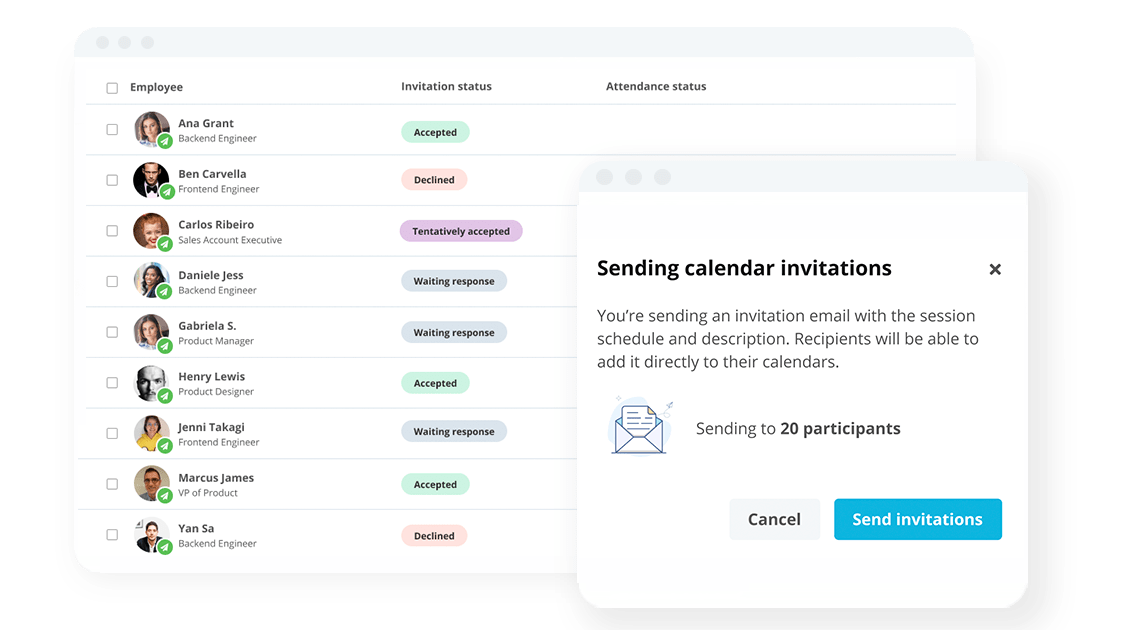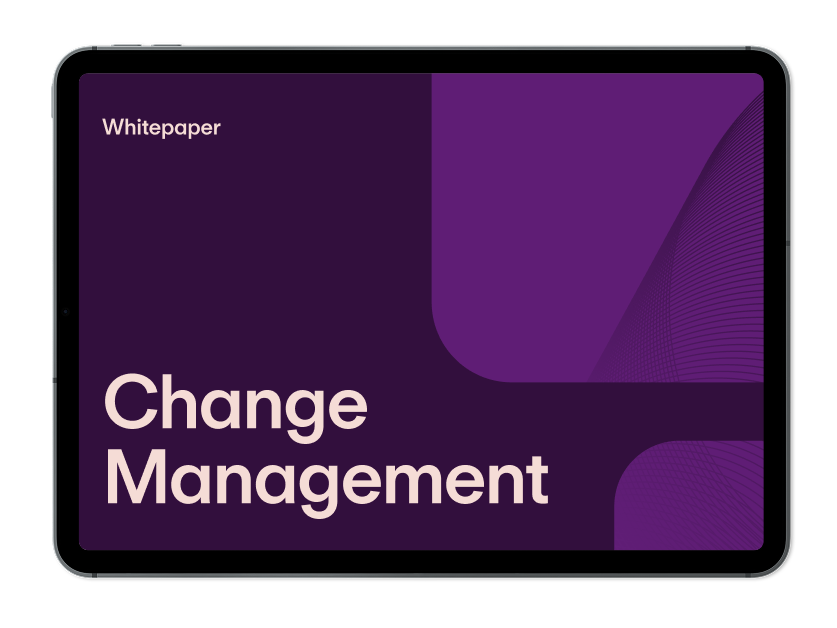
Give the Right Training at the Right Time
Simplify your staff development with centralised training management.
An Expert Guide to Job Enlargement

Job enlargement can help employees feel more connected and interested in their work. This comprehensive review of the job enlargement process details how the practice of expanding an employee’s role can successfully keep your top performers engaged.
Key Facts
Job enlargement adds new responsibilities without requiring an employee to go beyond the scope of their job title.
Job enlargement encourages learning new skills.
Through training and gradual introductions, HR can successfully implement job enlargement protocol.
Contents
- 1Job Enlargement Definition: What Is Job Enlargement?
- 2Advantages of Job Enlargement
- 3Disadvantages of Job Enlargement
- 4Example of Job Enlargement in Practice
- 5Job Enlargement vs Job Enrichment
- 6How Can the HR Department Support Job Enlargement?
- 7Enrich the Employee Experience
- 8Frequently Asked Questions About Job Enlargement
Job Enlargement Definition: What Is Job Enlargement?
Job enlargement is when a company adds tasks to an existing role that are appropriate for that employee’s organisation level. It widens the scope of individual team members’ positions without overburdening their schedules or impeding on the limitations of their job title.
Advantages of Job Enlargement
Job enlargement can help the right employees broaden their horizons in the workplace.
Increased Flexibility in the Workplace
Workers with expanded roles can develop the ability to work proficiently in multiple areas. By learning new skills and taking on new responsibilities, they can apply their knowledge and abilities to develop novel solutions to pressing workplace issues. This flexibility in their thinking benefits the company as a whole while simultaneously enriching the employee’s professional experience.
A Pay Boost
More responsibilities often means more money. Not only is an employee gaining valuable skills, but the increase in responsibilities can mean a higher wage or other types of compensation as well.
Reduced Monotony in Their Day-to-Day Role
With increased responsibility comes increased variety in job tasks. If an employee seems restless in a role, job enlargement helps introduce them to multiple stages of a project. The varied work can help keep them engaged with their tasks and motivated to produce excellent results.
Professional Development
Learning a new skill or area of the company gives employees new tools to use as part of their professional development. Job enlargement can close skills gaps and make your workforce more well-rounded, priming them to excel in their careers and making them eligible for promotions in your company over time.
A Positive Challenge for Motivated Employees
New elements to old routines can be just what an employee needs to thrive. This small change to their work process can have a big impact, encouraging more creative use of their skills and signalling that you trust the employee to get these new tasks done right.
Disadvantages of Job Enlargement
While job enlargement can positively affect your workforce, not everyone is cut out for the extra responsibility.
It Could Hurt Morale
Offering a team member more and more work with no associated reward may drive a wedge between them and the company. Added responsibilities need to be fairly compensated as well, and an employee not receiving adjusted compensation may feel shortchanged. Take care to explain that job enlargement is not intended to replace a promotion or a title change.
It Could Affect Productivity
Job enlargement increases the number of things a typical employee needs to track each day. Adding more responsibilities can further split their attention and potentially lead to details getting lost in the shuffle. These small items can add up and eventually cause a decline in work quality. Ensure your workforce is prepared for any possible changes to the scope of their position so they can ease into the shift in their routines.
It Could Affect Their Work-Life Balance
More responsibility could mean the employee needs more time to complete their to-do lists each day. A constant increase could hinder your workforce’s ability to balance their work and leisure time, leading to taking work home with them or skipping days off altogether. Without a system to control the pace of job enlargement, your employees could resent the time they had to sacrifice to keep up.
It May Be Stressful
Too many new tasks at once can overwhelm workers unprepared for the shift in their workplace routine, leading to a rapid buildup of stress. That strain can cause a drop in productivity and performance, so scheduling time for relaxation and socialising is critical to keeping your workers at their best. Consider a slow introduction of the additional responsibilities as well to help ease an employee into their new role.
You May Face Resistance to Change
Not everyone is ready for a new way of doing things in the workplace. You may find employees throughout the workplace to be uninterested or unwilling to participate in this type of programme. Roll out job enlargement programmes thoughtfully and engage with employees who are most likely to benefit for the greatest chances of success.
Making Change More Successful

Our change management guide offers a look into the processes that help make change in your organisation more successful and sustainable.
Download Our GuideExample of Job Enlargement in Practice
Increasing the scope of an employee’s role often looks different depending on the position and the context behind its enlargement.
Let’s say a company’s HR department is ready to roll out a new benefits programme that includes health initiatives like a fitness centre membership or yoga classes. However, the manager who put together the programme does not have time to talk employees through how to sign up or answer questions about eligibility. To manage proper information channels about this programme, the HR manager can train an associate in corporate communication skills. The HR associate can learn valuable skills in facilitating productive meetings and communicating core details about the new offering, skills that will prove valuable later down the line.
Job Enlargement vs Job Enrichment
Job enlargement is one form of job enrichment, but not all job enrichment is job enlargement.
Job enrichment refers to a wide range of tactics aimed at making an employee’s job more interesting and engaging. It introduces variety, complexity and responsibility within their roles, with the ultimate goal of giving employees more autonomy over how they work and the solutions they develop. Job enlargement is just one such method of overall job enrichment.
How Can the HR Department Support Job Enlargement?
HR plays a vital role in successfully implementing job enlargement measures. Some things they typically do to support the job enlargement process are:
Encouraging participation in the programme. HR can meet with managers and share the goals of job enlargement. Managers can identify candidates and work with HR to develop a new scope for the employee.
Collecting feedback. HR can solicit input from employees and apply their insight into further professional development.
Helping with analysis. HR can work with managers to analyse employee roles and tailor job engagement to those who are most likely to benefit from it. Careful analysis before increasing the scope of someone’s position helps determine who’s most likely to be successful.
Introducing the programme gradually. Introducing several new responsibilities to your employees with minimal instruction on juggling the new tasks usually just causes stress. You can develop a method of gradual introduction that lets employees familiarise themselves with their role’s expanded scope piece by piece and determine how much they can handle.
Providing training opportunities. HR should offer development resources alongside job enlargement to get employees up to speed with their expanded roles as quickly as possible. Mentorship from experienced colleagues and training courses can teach necessary knowledge and close vital skills gaps that slow down a worker’s success.
Enrich the Employee Experience
Boredom tends to kill productivity in the workplace because employees become so used to their routines. They’re less engaged, and the quality of their work tends to suffer.
Job enlargement introduces new responsibilities into your staff’s schedules to give them new knowledge to learn and challenges to surmount.
These unique experiences help reinforce their engagement with the company and motivate them to perform at their best.
Frequently Asked Questions About Job Enlargement
How Does Job Enlargement Benefit a Company?
Job enlargement can result in a more well-rounded and highly motivated staff. Increased employee engagement often leads to greater productivity and improved overall job performance.
What Is the Difference Between Job Enlargement and Job Enrichment?
Job enrichment is an overarching concept that refers to expanding the skills and responsibilities of a role with the aim of making it more motivating. It encompasses several methodologies. Job enlargement is one such method of job enrichment.
What Are the Main Obstacles When Implementing Job Enlargement?
The main obstacles to implementing job enlargement are:
Resistance to change
Inability to adapt to the expanded role
Hurting morale if it’s not rolled out effectively
Does Job Enlargement Work in All Industries?
Yes. Job enlargement is a broad enough process that a version of it can appear in most, if not all, industries.
Disclaimer
We would like to inform you that the contents of our website (including any legal contributions) are for non-binding informational purposes only and does not in any way constitute legal advice. The content of this information cannot and is not intended to replace individual and binding legal advice from e.g. a lawyer that addresses your specific situation. In this respect, all information provided is without guarantee of correctness, completeness and up-to-dateness.